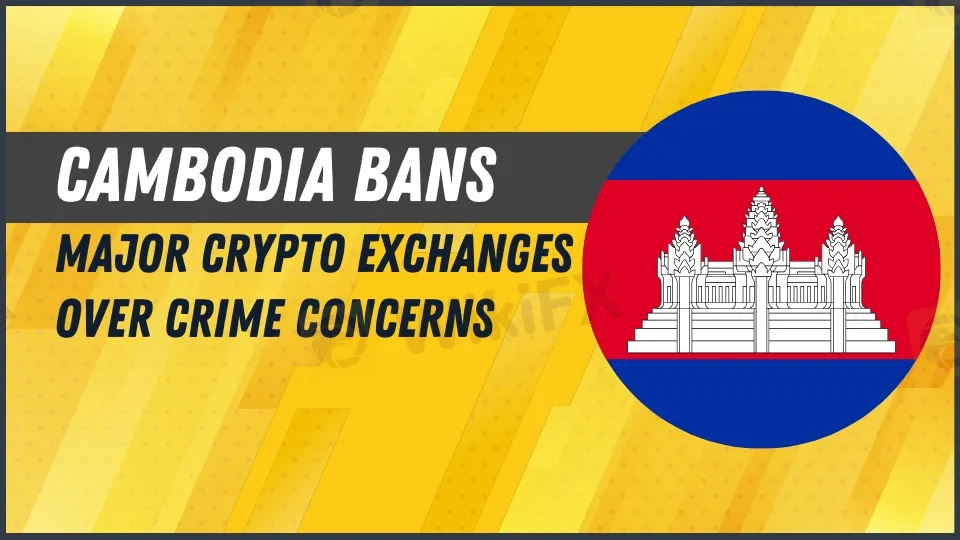简体中文
繁體中文
English
Pусский
日本語
ภาษาไทย
Tiếng Việt
Bahasa Indonesia
Español
हिन्दी
Filippiiniläinen
Français
Deutsch
Português
Türkçe
한국어
العربية
Cambodia Bans Major Crypto Exchanges Over Crime Concerns
Abstract:Cambodia blocks access to Binance, Coinbase, and OKX amid a crackdown on illegal crypto activities like money laundering, with mobile apps still operational.

Cambodia has blacklisted 16 major cryptocurrency trading websites, including Binance, Coinbase, and OKX. The Telecommunication Regulator of Cambodia (TRC) is enforcing this step against cryptocurrency exchanges that do not have sufficient licenses from the Securities and Exchange Regulator of Cambodia.
While the crackdown largely impacts internet access, mobile applications for these platforms continue to function, allowing users to trade. This step is part of the Cambodian government's larger regulatory effort to combat illegal activities such as internet gambling, money laundering, and crypto-related crimes.
Limited Regulatory Framework in Cambodia
Cambodia's cryptocurrency regulatory system is still in its early stages, with just two businesses approved to operate under the SERC's FinTech Regulatory Sandbox program. These platforms are not permitted to offer digital asset exchanges for fiat currencies such as the Cambodian riel or the US dollar, which limits their scope.
Despite these constraints, Binance has established itself in Cambodia. Binance signed a memorandum of understanding (MoU) with SERC in 2022 to help draft rules for digital currencies. Furthermore, Binance worked with Cambodian conglomerate Royal Group to teach Interior Ministry staff to detect and prevent crypto-related crimes.

A Hotspot for Crypto Scams and Cybercrime
Cambodia's rising reputation as a hotspot for cryptocurrency fraud and criminality is causing alarm. The United Nations Office on Drugs and Crime has identified the nation as a hotbed for illegal activity, such as bogus Bitcoin scams. Many of these activities are said to be carried out by criminal syndicates, notably in Sihanoukville and other places.
Despite the crackdown, Cambodia continues to rank among the top 20 nations in terms of retail bitcoin usage per capita. Unofficial Bitcoin transactions continue to flourish, particularly in peer-to-peer markets. In reality, the Cambodian digital asset market is expected to earn $8 million in revenue by 2024, however, development may decrease by 2025.
Huione Guarantee's Role in Illegal Activities
Huione Guarantee, a marketplace purportedly connected to Cambodia's royal family, is a significant player in the country's contentious cryptocurrency industry. This site has been linked to deepfake fraud and money laundering schemes. Elliptic, a blockchain analytics firm, believes that since 2021, crypto wallets linked to Huione and its merchants have received at least $11 billion, with a major part thought to be related to illicit activity.
Huione Guarantee provides a peer-to-peer transaction platform, however, it has been accused of providing escrow services for Telegram transactions. The network is also related to “pig butchering” scams, in which victims are monetarily drained by someone posing as love partners.
Huione says that its use of different chat applications prevents it from monitoring the particular activity of its merchants. However, its role in money laundering and fraud continues to be a major problem.
Final Thoughts
As Cambodia tightens its assault on unauthorized cryptocurrency exchanges, it must strike a difficult balance between regulating the industry and encouraging innovation. The surge in illegal operations, notably through platforms like the Huione Guarantee, highlights the critical need for increased regulatory monitoring and international collaboration. While the crackdown may impede Cambodia's cryptocurrency sector, it is unlikely to completely kill the country's digital asset business. The following moves taken by the government will have a significant impact on Cambodia's cryptocurrency future.

Disclaimer:
The views in this article only represent the author's personal views, and do not constitute investment advice on this platform. This platform does not guarantee the accuracy, completeness and timeliness of the information in the article, and will not be liable for any loss caused by the use of or reliance on the information in the article.
Read more

Malaysian-Thai Fraud Syndicate Dismantled, Millions in Losses Reported
The Royal Malaysia Police (PDRM) has received 26 reports concerning the Nicshare and CommonApps investment schemes, both linked to a major fraudulent syndicate led by a Malaysian citizen. The syndicate’s activities came to light following the arrest of its leader by Thai authorities on 16 December.

Malaysian Pensioner Loses RM823,000 in Fake Investment Scam
A 61-year-old man from Batu Pahat, Malaysia, has fallen victim to a fraudulent investment scheme, losing a staggering RM823,000. Local authorities revealed that the man was lured through a Facebook advertisement promoting an investment opportunity with promises of substantial returns.

Malaysia’s Crypto Landscape: Adapting Amidst Global Ambitions
The United States is intensifying its efforts to become a global cryptocurrency hub under President-elect Donald Trump. Experts believe this move could prompt countries, including Malaysia, to reassess their regulatory approaches toward digital assets.

SEC Approves Hashdex and Franklin Crypto ETFs on Nasdaq
The SEC has approved crypto index ETFs by Hashdex and Franklin Templeton, including Bitcoin and Ethereum, marking a milestone in crypto asset investment.
WikiFX Broker
Latest News
ASIC Sues Binance Australia Derivatives for Misclassifying Retail Clients
Top 10 Trading Indicators Every Forex Trader Should Know
WikiFX Review: Is FxPro Reliable?
Malaysian-Thai Fraud Syndicate Dismantled, Millions in Losses Reported
Trading frauds topped the list of scams in India- Report Reveals
Revolut Leads UK Neobanks in the Digital Banking Revolution
Fusion Markets: Safe Choice or Scam to Avoid?
SEC Approves Hashdex and Franklin Crypto ETFs on Nasdaq
WikiFX Review: Something You Need to Know About Markets4you
Malaysian Pensioner Loses RM823,000 in Fake Investment Scam
Currency Calculator


